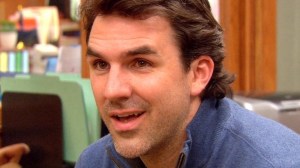Videos by ComicBook.com
This is a spoiler-free interview, since we knew it would run the day The President’s Shadow was released, so no worries there. As far as Identity Crisis, Meltzer’s comic book miniseries from more than a decade ago? Well, yeah, we’ll spoil that a little.
The first chapter of the book, along with Meltzer’s story celebrating 75 years of Batman, is available digitally for free here. You can buy the full novel here.
The President’s ShadowVideos by ComicBook.com
You’re very smart for thinking that. I thought I was the only person that was ever going to get that, but you’re a good reader. On the back of that one, it says, “Meet Shadow,” it’s right there, but I was like “Who’s going to remember that but me?”
Now, this is the third book in a series, but prior to this you’ve never had a specifically-connected story in that way. As a writer, do you perceive those previous books has having happened in the same shared universe?
If you really, really look, there’s ties to just about every single book in every other book.
But the same way I treat comic book continuity, I treat the character in my thrillers, which is that if you catch it, you get a reward, but if you lean on that too much and you don’t tell a good story, then you’re just using it as a crutch and that’s not fair to the reader. So the story has to stand on its own and if it does, you can put in all the eggs you want to in there.
But you’ll see that the bad guy in The Tenth Justice is actually on one page of Dead Even. I won’t say what happens, but if you know his real name, you’ll know what happens to him. The President from The First Counsel was mentioned in The Book Of Fate, but it’s just one line. If you didn’t notice, you didn’t miss anything.
ArrowI would love to do that one day when I have the time. Until then, Arrow is in beautiful hands. Marc Guggenheim and Greg and everyone on the writing staff there — these are my friends, I’ve known them for years, they’re incredible…which is probably also why people are reading my books on the show.
What has been your response to the critical response to Identity Crisis over the years I’ve never heard you address that in the past, and you’re not a writer who typically gets a lot of that.
You know what? I feel very lucky to what the response has been over the years since Identity Crisis. I think it’s great that it was embraced by so many people, but of course anything released today is going to find its critics. I never really know what to say to that. The only thing I can say is that the number one thing that’s been said to me over and over and over again about Identity Crisis is, that’s the book that got me reading comics or that’s the book that got me reading DC Comics. As far as I’m concerned, I can’t get a better compliment than that.
So with any mystery, there’s going to be people who don’t like the ending. With anything that’s controversial, there’s going to be people who say “You should have done this,” or “you shouldn’t have done that.” Again, to me, the work will always just have to at the end of the day speak for itself.
Identity Crisis is somewhat unique, though, in that it spawned hundreds of pages of feminist theory and became a shorthand in comics circles within a year or so of being released.
Yeah, you know, when The Tenth Justice came out, there were people who said it was the greatest new voice of a generation. And that was immediately fought back by people who said that I was the worst thing that ever happened to writing.
A dear friend who’s been in the industry for a long time said that the very worst thing you can do is not affect you at all. If you have some people who love you and some people who hate you, that means you’re doing something right. The very worst thing people can say about you is, “That’s just okay.”
So back to your book: series are incredibly common in mystery and thriller books, but you’ve not done one before. What made you decide to finally do it?
What happened to me was comics. That’s where I stole it from, is that when I started as a novelist, I thought that if you’re using the same character over and over again, you’re lazy. Readers deserve something new every time and if you bring back the same characters it just means you’ve run out of ideas. And I was really obnoxious about my belief in that.
Then I started writing comics and I realized that you can get so many beautiful layers when you come back to the same character and the character gets deeper with each telling and there’s so much beauty you can find there…and wait a minute, why aren’t I doing that, too? So if anything, I blame Green Lantern and Batman and Superman for this. That’s where Beecher was really born.
Going in, did you know that Beecher was going to become the star of a series, or did that develop after you’d already finished the first book?
I knew from the start that Beecher was coming back and I knew his arc over the three books.
It seems like you must build a character very differently when you’ve got more than one story to tell with them.
It was absolutely different. When you have the characters for one book, you have one problem for the characters, they solve the problem and the characters learn something today and you can move on. With Beecher, I needed someone who has a much deeper well to pull from.
I always knew that it was going to come around to where we are in the present. I didn’t know the hows and the whys and every detail, but I absolutely knew that this is where I wanted to be. I always say that we find James Bond and he’s this great hero, and my real goal with Beecher was, can I take a James Bond or a Jason Bourne character, find him before they become that person — when they’re nobody, when they’re nothing, when they’re weak, when they’re starting — and then over the course of a few books build them into what we want?
So when you meet Beecher in that first book he’s just nowhere near the character that he in the third book, and that was always by design. The design was that this would be his hero story.
Do you plan to continue with him, or is this the end of his arc?
The next book after this will not be a Beecher book, because I feel like I just want to refresh. For the same reason I wouldn’t want to write 500 Batman stories back to back — eventually, as silly as it sounds, you want to go back to the well and start something new. I feel like I want to take a step away from Beecher, let him grow a little bit in my brain and then come back. But I definitely want to come back.
You have a rare talent to be able to tell stories about Presidents and Supreme Court justices and keeping the stakes kind of real. Sometimes I feel like authors — once they introduce these kind of larger-than-life characters, the stakes just evaporate and the reality evaporates. Does that makes sense?
It does, and I work harder at that than you realize. I could never write a President until I met a President. In fact, if you read The First Counsel, The President appears on like four pages and I don’t think he has a single line of dialogue. It was like, I can’t write that character, I can’t relate to that character. It was unapproachable to me.
And then as I got older and as I became a father and as I met real Presidents and they became real people to me, human beings, now I could write them.
Superman The Man of SteelAnd you just realize that he’s so fast, he’s so much faster than this mugger, and that is one of the most satisfying moments becuase it’s a human, real moment that you can live yourself.
That’s what I try to keep in mind, is that this is the most important day of the character’s life, but it’s not a day that could never happen.
You know, I hadn’t thought of that idea, of comparing Presidents and the like to superheroes.
It’s the same thing! When you’re writing Superman, it’s so easy to write a bad Superman, a cliched Superman. “Don’t worry, Lois! I’ll protect you!” And it’s the same thing with a U.S. President. It’s so easy to write a bad scene: “Yes, Sir, no, Sir, right away, Sir.” What’s hard is to make them human and make them alive, and you really have to dig deeper for that, but to me, that’s where the best stories are told.












